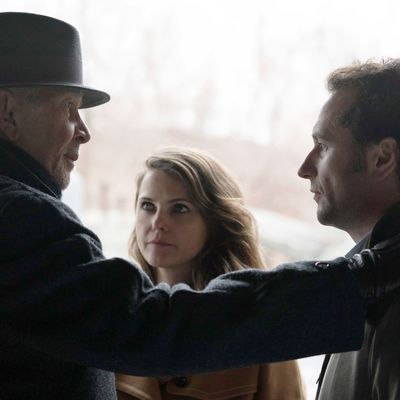
Family can be a great source of comfort, but it can also be a huge liability. That’s especially true when your parents happen to be Russian spies, but even for normal folks, the emotional (and legal) bond between parent and child leaves a family vulnerable to risk, compelling people to do things they don’t want to do, or preventing them from protecting themselves. Though this point has been implicit from the start of the series, “Persona Non Grata” drives it home, in characteristically tense fashion, as it closes an excellent, particularly domestic season of The Americans.
As season finales go, this one doesn’t have much action or big cliff-hangers, but its implications are heart-stopping. (At the halfway point of “Persona Non Grata,” I thought The Americans was preparing to transition the entire series to Russia next season. That almost certainly won’t be the case, but the groundwork for such a shift is definitely there.) The most “exciting” sequences, per se, are the cold open and post-opening scenes, where the FBI tails William as he prepares to hand off the Lassa specimen to Philip. It’s a trickily choreographed set piece that purposely keeps us off guard as William, Philip, and the FBI all converge near a park at night. If The Americans were a different sort of series, William purposely infecting himself with the modified Lassa strain would be a big cliff-hanger — the episode would cut to black just as the FBI apprehends him — but this show generally finds more subtle and sophisticated ways to build and release tension. And so William spends the majority of this finale as “a dead man,” under observation by Stan and Aderholt in a biocontainment unit, helpfully outlining the episode’s pertinent themes before everything inside of his body, to use his words, oozes out of his orifices. (That’s our William: unpleasant to the bitter, bile-choked end.)
While Philip, Elizabeth, and Gabriel wonder if William is happily ratting them out to the authorities in his dying moments — he did give them that dead rat a few episodes back, after all — he instead expounds on loneliness, conviction, and the American Dream. (William does let slip, while barely conscious, that there’s a couple with two kids out there who have been working with him, but that’s not much to go on — and Stan certainly doesn’t seem the least bit suspicious when he later sees Philip.) For all our Directorate S trio knows, though, William’s already turned on them, which leads Gabriel to drop a very quiet but earth-shaking bomb: He thinks Philip and Elizabeth should take their kids and return “home” to Russia.
Philip and Elizabeth’s shock in the wake of this conversation is pointed, given that both of them have considered this very situation with varying degrees of enthusiasm. Now that they can legitimately flee, the consequences of doing so seem much more real … and much less appealing. Neither of them can picture their children living in Russia. Hell, they can barely picture Russia at this point.
But we can, thanks to a handful of sequences that follow Philip’s long-lost son, Misha. Misha’s sudden reappearance in the story line, as he embarks on a mission to find his birth father in America, aligns well with the finale’s exploration of the parent-child bond. (See also: Oleg’s reluctant return home to tend to his mother.) In a pressing way, it also gives us an extended look at the situation Philip and Elizabeth came from, and may have to return to. Contrast Misha’s dreary, noisy, gray-blue environs with the warm, inviting, fashionable (for the ‘80s) Jennings home. This is the setting that molded Philip and Elizabeth, that fomented the commitment that drove them (and William) to do what they do. But as Philip opines to his EST class, the decisions born of youthful conviction don’t always translate to adult life — which, in Philip’s case, happens to coincide with his American life. What appeal could Russia hold for him now? (It certainly seems to hold little appeal for his eldest son, who appears to have inherited Philip’s skeptic streak, if his “anti-Soviet” activities are any indication.) When Elizabeth mulls what it might be like to go home after 20 years, Philip seems utterly uninterested in the exercise, and cynical toward the suggestion that the country may have transformed into a place where he’d be happy to live. This is all quite ironic, considering that Philip advocated fleeing to Russia in the wake of the Pastor Tim catastrophe, but it’s also more than a little tragic. The decisions of Philip and Elizabeth’s idealistic youth resulted in two children who might have to face the horrible consequences.
In other “careful what you wish for” news, Paige’s transformation into Mommy’s Little Spy continues apace. Elizabeth seems legitimately torn between pride and sadness over her daughter’s recent behavior: asking her mom for tips on how to defend herself, deftly planning an operation to check in on Pastor Tim and Alice’s new baby, and, most uncomfortably, pumping Matthew Beeman for info on his dad in between makeout sessions. Even Paige doesn’t seem to know why she’s doing this — it’s all a big muddle of loyalty, curiosity, teenage rebellion, hormones, and who knows what else. She has the drive, and apparently the talent, but she lacks the commitment that brought her parents (and William, can’t forget poor William) to become spies in the first place. She’s mimicking her parents almost despite herself: Note the echoes between her date with Matthew and the first image we ever saw of Elizabeth in this series, on a “date” with a source. I’m not suggesting Paige is consciously seducing Matthew, but I do think she’s experimenting with some of the tools of her parents’ trade. Philip certainly seems to think so, as he clearly states after finding out what Paige and Matthew were up to during the Super Bowl. “Don’t do this, Paige,” he hisses at his daughter, all but dragging her into the house. “You have no idea. No idea.”
As Philip and Elizabeth disappear inside, the last shot of the Jenningses’ home is so unlike our typical view that it’s downright chilling. It’s huge and dark and looming, weighted with significance and dread. It’s the Jenningses’ shelter, but it’s also a symbol of their curse. When Philip and Elizabeth decided to join the KGB, America was an abstract concept, as were the lives they would have. Now they’re responsible for Paige and Henry, two very real people who were born of this mission, and whose lives have the potential to be utterly destroyed. It’s the American Dream turned nightmare, a home haunted by Philip and Elizabeth’s past. And possibly, their future.


